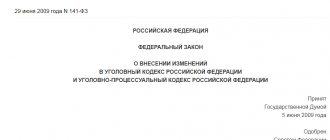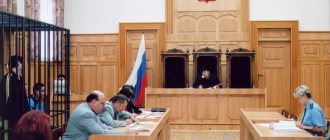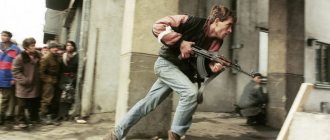ST 229 of the Criminal Code of the Russian Federation.
1. Theft or extortion of narcotic drugs or psychotropic substances, as well as plants containing narcotic drugs or psychotropic substances, or their parts containing narcotic drugs or psychotropic substances, is punishable by imprisonment for a term of three to seven years, with restriction of freedom for a term of up to one year or without it.
2. The same acts committed: a) by a group of persons by prior conspiracy; b) has become invalid; c) by a person using his official position; d) using violence that is not dangerous to life or health, or with the threat of using such violence; e) in a significant amount - is punishable by imprisonment for a term of six to ten years with a fine in the amount of up to five hundred thousand rubles or in the amount of the wages or other income of the convicted person for a period of up to three years, or without it and with restriction of freedom for a term of up to one year or without it.
3. Acts provided for in parts one or two of this article, if they are committed: a) by an organized group; b) on a large scale; c) with the use of violence dangerous to life or health, or with the threat of using such violence, - d) has become invalid, - shall be punishable by imprisonment for a term of eight to fifteen years with a fine in the amount of up to five hundred thousand rubles or in the amount of wages or other income of the convicted person for the period 4. Acts provided for in parts one, two or three of this article, if committed on an especially large scale, are punishable by imprisonment for a term of fifteen to twenty years with a fine in the amount of up to one million rubles or in the amount of wages wages or other income of the convicted person for a period of up to five years or without it and with restriction of freedom for a period of up to two years or without it.
Commentary to Art. 229 Criminal Code
1. The subject of the crime is narcotic drugs, psychotropic substances and their analogues, as well as plants containing narcotic drugs or psychotropic substances, or parts of such plants (see commentary to Article 228 of the Criminal Code).
2. The objective side of the crime is theft in any form or extortion of the items specified in the article.
3. Responsibility for the theft of items specified in the disposition of the article occurs in cases of unlawful seizure of them from legal entities or individuals who own them legally or illegally. Theft also includes the collection of plants included in the List given in Decree of the Government of the Russian Federation of November 27, 2010 N 934, from the lands of agricultural and other enterprises, as well as from the land plots of citizens on which these plants are illegally grown.
4. Actions for subsequent storage, processing, transportation, forwarding, and sale of items specified in the law should be qualified under Art. 229 of the Criminal Code and for the totality of crimes under Art. 228 of the Criminal Code or under Art. 228.1 CC.
5. For significant, large, especially large amounts of narcotic drugs, psychotropic substances, plants containing narcotic drugs or psychotropic substances, or parts of such plants, see Decree of the Government of the Russian Federation of October 1, 2012 N 1002.
Second commentary to Art. 229 of the Criminal Code of the Russian Federation
1. The subject of the crime in question is narcotic drugs or psychotropic substances, as well as plants (or parts thereof) containing narcotic drugs or psychotropic substances (see comments to Article 228 of the Criminal Code).
2. Theft of the above-mentioned funds, substances and objects means their illegal and gratuitous removal from the legal or illegal possession of legal entities or individuals for the purpose of personal consumption or illegal use in any other way. Theft is also recognized as the collection of drug-containing plants or their parts (pods and stems of poppies, stems of hemp, etc.) from the land plots of agricultural and other enterprises and from the land plots of citizens on which these plants are grown (see paragraph 23 of the resolution of the Plenum of the Supreme Court of the Russian Federation dated June 15, 2006). At the same time, the collection of wild drug-containing plants, as well as the collection of such plants from land plots where they are grown legally or illegally, after the completion of harvesting and removal of protection in connection with this, cannot be considered as theft and is subject to qualification under Art. 228 CC.
3. The theft of relevant funds, substances and objects is recognized as a completed crime from the moment of the actual seizure of these funds and substances and the perpetrator has a real opportunity to use the stolen property or dispose of it in another way. However, the theft of these funds and substances by robbery should be considered a completed crime not from the moment of seizure of these funds and substances, but with the beginning of the attack, coupled with the use or threat of use of violence dangerous to life or health, and committed for the purpose of theft of narcotic or psychotropic drugs substances.
4. Extortion of the means, substances and objects named in the disposition means an illegal demand for their transfer to the perpetrator or persons represented by him under the threat of violence, destruction or damage to property or the dissemination of information disgracing the victim or his relatives, or other information, the publicity of which could cause significant harm the rights or legitimate interests of the victim or his relatives.
In this form, the crime is considered completed from the moment an illegal demand is presented to transfer narcotic drugs or psychotropic substances, supported by a corresponding threat.
5. Victims of extortion can be not only citizens who legally or illegally possess the means, substances or objects specified in the law, but also persons empowered to issue documents giving the right to legally purchase narcotic drugs or psychotropic substances, as well as persons who have access to narcotic drugs or psychotropic substances, or persons whose production or official activities are related to the legal circulation of narcotic drugs or psychotropic substances (clause 24 of the resolution).
6. The acquisition of narcotic drugs or psychotropic substances is fully covered by theft or extortion and does not require additional qualifications. However, subsequent storage, processing, transportation, forwarding, sale or processing of narcotic drugs or psychotropic substances obtained as a result of theft or extortion must be classified as a set of crimes provided for in Art. 229 and 228 or 228.1 of the Criminal Code (clause 25 of the resolution).
7. Theft or extortion of narcotic drugs or psychotropic substances committed by a stable armed group must be classified as a set of crimes provided for in Art. 229 and 209 of the Criminal Code (clause 26 of the resolution). The totality of crimes provided for in Art. 229 and 210 of the Criminal Code constitute theft or extortion of narcotic drugs or psychotropic substances committed by a criminal community.
8. From the subjective side, the crime in question is committed only with direct intent.
9. The subject of a crime can be a person who has reached the age of 14 years.
10. Qualified types of the crime in question are characterized by its commission under the circumstances specified in Part 2 of Art. 229 CC.
The content of signs of an act being committed by a group of persons by prior conspiracy (clause “a”), the use by a person of his official position (clause “c”) in the theft or extortion of narcotic drugs or psychotropic substances is similar to their content in Art. 228.1 CC.
Theft or extortion of narcotic drugs or psychotropic substances using violence not dangerous to life or health, or with the threat of using such violence (clause “d”) means that when committing the crime in question, the perpetrator actually used violence not dangerous to life or health , or threatened to use just such violence if there were real reasons to fear that this threat would be carried out (see commentary to paragraph “d”, Part 2 of Article 161 of the Criminal Code).
11. For a significant amount (item “e”), see comments to Art. 228 CC.
12. Particularly qualified types of the analyzed crime are characterized by its commission in the presence of one of the three especially aggravating circumstances listed in Part 3 of Art. 229 CC.
13. The commission of this crime by an organized group must be understood in accordance with Part 3 of Art. 35 of the Criminal Code of the Russian Federation.
14. The large amount of narcotic drugs or psychotropic substances must be established in accordance with Decree of the Government of the Russian Federation of October 1, 2012 No. 1002.
15. In paragraph “c” of Part 3 of Art. 229 of the Criminal Code provides for the commission of this crime both in the case of actual use and in the case of a real threat of use of violence dangerous to life or health (see comments to paragraph “c” of Part 2 of Article 126, to Article 162 of the Criminal Code). The use of violence or the threat of its use is fully covered by the crime provided for in paragraph “c” of Part 3 of Art. 229 and does not require additional qualifications under Art. 162 or 163 of the Criminal Code (clause 26 of the resolution). But in cases of actual infliction of grievous harm to the health of the victim, the deed follows along with paragraph “c” of Part 3 of Art. 229 of the Criminal Code shall be additionally qualified under Art. 111 of the Criminal Code.
Contents of Art. 229 TK
At the beginning it is stated that to investigate an accident, the employer (his authorized representative) urgently forms a commission of at least three participants. It includes:
- a person involved in labor protection - this may be a specialized specialist or an employee authorized for this purpose;
- a representative of the employer, trade unions or other structures protecting the interests of personnel;
- Occupational Safety and Health Commissioner.
The head of the formed commission is the employer or his authorized representative. But in some situations described in the Labor Code, it is headed by a representative of the government agency involved in supervision in the established field of activity.
When the emergency is severe, the commission is replenished with additional participants:
- state labor inspector;
- a representative of a regional or local government authority;
- representative of the association of trade union organizations.
In this option, its head is usually a representative of a federal government agency responsible for overseeing labor relations.
In case of an insurance situation, a representative of the insurer (at the place of registration of the employer) is also included in the commission.
The serious nature of the accident is determined when:
- one or more persons were seriously injured;
- it ended in death.
The composition of the commission is fixed by order of the employer, unless another option is specified in the Labor Code. It is emphasized that persons who were personally involved in ensuring the safety of work at the site where the emergency occurred are not included in its composition.
The following describes the nuances of staffing the commission for various incident scenarios.
If an emergency occurs with an individual employer, then the following will be involved in the proceedings:
- the employer himself;
- a person representing the interests of the victim;
- occupational safety specialist - he can also act under a contract.
In a situation where an emergency occurred with a person sent to work for another employer, it is investigated by a commission formed by the employer who experienced the emergency. It includes a representative of the employer who referred the victim. It is emphasized that the absence or lateness of this representative does not affect the change in the time limits of the proceedings.
If an emergency occurs with a person who worked on the territory of another employer, then it is investigated by a commission formed by the employer (his authorized representative) on whose instructions this work was carried out. It is also possible for the employer, who is legally assigned to this area, to participate.
If an emergency occurred with a person who worked on behalf of the employer or his authorized representative on the allocated site of another employer, then a commission for investigation is formed by the employer responsible for the work. The participation of a representative of the employer on whose site the work was carried out is also necessary.
In a situation where an emergency occurred with a part-time employee, it is subject to recording and analysis at the place of part-time work. In this option, the employer or his authorized representative, having received the consent of the victim, informs the main employer about the results of the proceedings.
If an emergency occurs with the participation of transport - in the event of a disaster, accident or other damage - then the investigation is carried out by a commission formed and headed by the employer or a person authorized by him. But at the same time, the proceedings must take into account the data obtained during the investigation:
- a specialized government agency engaged in supervision in the established field of activity;
- bodies of investigation and inquiry;
- the owner of this vehicle.
It is emphasized that any victim has the right to personally participate in the investigation of his accident. His representative has the right to do this.
Another authorized person has the right to participate in the proceedings if a demand is received:
- the victim himself;
- his close relatives;
- dependent on him (at the death of the victim).
If a legal or trusted person was unable to carry out the investigation, then he is given access to his materials. This responsibility rests with:
- employer;
- his authorized representative;
- head of the commission.
In a situation where an emergency occurred due to violations of standards affecting technical safety at nuclear energy facilities, a representative of the local government agency that controls the nuclear energy sector is included in the commission.
If an emergency occurred at a facility/organization controlled by a local representative of a government agency responsible for supervision in the industrial safety sector, then the members of the commission are approved by the head of this government agency, and a representative of this body is appointed as its head.
In case of a group emergency, when five or more people have died, the commission also includes representatives of:
- a federal government agency responsible for the supervision of labor relations;
- All-Russian Association of Trade Unions.
Its head is the head of the state labor inspectorate of the appropriate rank. If such an emergency occurred at a facility/organization controlled by a local representative of a government agency responsible for supervision in the industrial safety sector, then the commission is headed by the head of this government agency.






